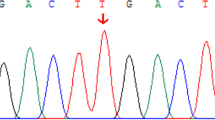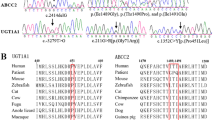Abstract
Background
The prognosis for patients with citrin deficiency is not always benign. This study examined the differences between patients identified early by newborn screening and patients identified later with cholestasis/hepatitis.
Materials and methods
This retrospective study included 42 patients with genetically confirmed SLC25A13 mutations who were born between May 1996 and August 2019. Fifteen patients were identified during newborn screening (NBS group) and 27 patients were identified through the onset of cholestasis/hepatitis in infancy (clinical group).
Results
Overall, 90% of the patients presented with cholestasis, among whom 86% (31/36) recovered at a median age of 174 days. Compared with patients in the clinical group, patients in the NBS group were significantly younger at diagnosis and at cholestasis-free achievement; they also had significantly lower levels of peak direct bilirubin and liver enzymes. At the median follow-up age of 11.8 years, 21% of the patients had dyslipidemia, whereas 36% of the patients had failure to thrive. The overall mortality rate was 2.4%. Variant c.851_854del was the most frequent, constituting 44% of the mutant alleles.
Conclusion
Patients identified early by NBS had a better prognosis, demonstrating the importance of a timely diagnosis of NICCD and the need for careful follow-up.
Impact
-
Some cases of neonatal intrahepatic cholestasis caused by citrin deficiency (NICCD) are not benign.
-
Compared with patients identified later based on the presence of cholestasis/hepatitis, patients identified early by newborn screening have less severe cholestasis and are cholestasis-free at a significantly younger age.
-
A timely diagnosis is needed, along with follow-up examinations that assess metabolic profile and body weight, to improve the long-term prognosis of NICCD patients.
This is a preview of subscription content, access via your institution
Access options
Subscribe to this journal
Receive 14 print issues and online access
$259.00 per year
only $18.50 per issue
Buy this article
- Purchase on Springer Link
- Instant access to full article PDF
Prices may be subject to local taxes which are calculated during checkout


Similar content being viewed by others

Data availability
The data analyzed during the current study are not publicly available due to individual privacy concerns but are available from the corresponding author on reasonable request.
References
Saheki, T. & Song Y. Z. Citrin deficiency. GeneReviews (eds Adam M. P. et al.) 31–40 (University of Washington, Seattle, WA, 1993–2023).
Saheki, T. & Kobayashi, K. Mitochondrial aspartate glutamate carrier (citrin) deficiency as the cause of adult-onset type II citrullinemia (CTLN2) and idiopathic neonatal hepatitis (NICCD). J. Hum. Genet 47, 333–341 (2002).
Saheki, T. et al. Pathogenesis and pathophysiology of citrin (a mitochondrial aspartate glutamate carrier) deficiency. J. Metab. Brain Dis. 17, 335–346 (2002).
Komatsu, M. et al. Citrin deficiency as a cause of chronic liver disorder mimicking non-alcoholic fatty liver disease. J. Hepatol. 49, 810–820 (2008).
Tamamori, A. et al. Effects of citrin deficiency in the perinatal period: feasibility of newborn mass screening for citrin deficiency. J. Pediatr. Res. 56, 608–614 (2004).
Ohura, T. et al. Clinical pictures of 75 patients with neonatal intrahepatic cholestasis caused by citrin deficiency (NICCD). J. Inherit. Metab. Dis. 30, 139–144 (2007).
Tamamori, A. et al. Neonatal intrahepatic cholestasis caused by citrin deficiency: severe hepatic dysfunction in an infant requiring liver transplantation. Eur. J. Pediatr. 161, 609–613 (2002).
Shigeta, T. et al. Liver transplantation for an infant with neonatal intrahepatic cholestasis caused by citrin deficiency using heterozygote living donor. Pediatr. Transplant. 14, E86–E88 (2010).
Yeh, J.-N. et al. Hepatic steatosis and neonatal intrahepatic cholestasis caused by citrin deficiency (NICCD) in Taiwanese infants. J. Pediatr. 148, 642–646 (2006).
Chen, H.-W. et al. Chubby face and the biochemical parameters for the early diagnosis of neonatal intrahepatic cholestasis caused by citrin deficiency. J. Pediatr. Gastroenterol. Nutr. 47, 187–192 (2008).
Hayasaka, K. & Numakura, C. Adult-onset type II citrullinemia: current insights and therapy. Appl Clin. Genet 11, 163 (2018).
Chen, S.-T. et al. Diagnosis of neonatal intrahepatic cholestasis caused by citrin deficiency using high-resolution melting analysis and a clinical scoring system. J. Pediatr. 161, 626–631. e622 (2012).
Lee, N.-C. et al. Time course of acylcarnitine elevation in neonatal intrahepatic cholestasis caused by citrin deficiency. J. Inherit. Metab. Dis. 29, 551–555 (2006).
Wang, L.-Y. et al. Newborn screening for citrin deficiency and carnitine uptake defect using second-tier molecular tests. BMC Med Genet 14, 1–6 (2013).
Song, Y.-Z. et al. Neonatal intrahepatic cholestasis caused by citrin deficiency: clinical and laboratory investigation of 13 subjects in mainland of China. Dig. Liver Dis. 41, 683–689 (2009).
Song, Y.-Z. et al. Genotypic and phenotypic features of citrin deficiency: five-year experience in a Chinese pediatric center. J. Int. J. Mol. Med. 28, 33–40 (2011).
Zhang, T. et al. Dynamic changes of metabolic characteristics in neonatal intrahepatic cholestasis caused by citrin deficiency. Front. Mol. Biosci. 9, 939837 (2022).
Chen, H.-A. et al. Improved diagnosis of citrin deficiency by newborn screening using a molecular second-tier test. J. Mol. Genet. Metab. 136, 330–336 (2022).
Shen, Q.-L. et al. Assessment of liver fibrosis by Fibroscan as compared to liver biopsy in biliary atresia. World J. Gastroenterology 21, 6931 (2015).
Rajakannu, M., Coilly, A., Adam, R., Samuel, D. & Vibert, E. Prospective validation of transient elastography for staging liver fibrosis in patients undergoing hepatectomy and liver transplantation. J. Hepatol. 68, 199–200 (2018).
Serra-Burriel, M. et al. Transient elastography for screening of liver fibrosis: cost-effectiveness analysis from six prospective cohorts in Europe and Asia. J. Hepatol. 71, 1141–1151 (2019).
Abuduxikuer, K., Chen, R., Wang, Z.-L. & Wang, J.-S. Risk factors associated with mortality in neonatal intrahepatic cholestasis caused by citrin deficiency (NICCD) and clinical implications. BMC Pediatr. 19, 1–8 (2019).
Okano, Y., Ohura, T., Sakamoto, O. & Inui, A. Current treatment for citrin deficiency during NICCD and adaptation/compensation stages: strategy to prevent CTLN2. Mol. Genet. Metab. 127, 175–183 (2019).
Dimmock, D. et al. Citrin deficiency: a novel cause of failure to thrive that responds to a high-protein, low-carbohydrate diet. J. Pediatr. 119, e773–e777 (2007).
Kido, J. et al. Clinical manifestation and long‐term outcome of citrin deficiency: report from a nationwide study in Japan. J. Inherit. Metab. Dis. 45, 431–444 (2022).
Numakura, C. et al. Growth impairment in individuals with citrin deficiency. J. Inherit. Metab. Dis. 42, 501–508 (2019).
Acknowledgements
The authors would like to thank parents, physicians, co-workers participating in newborn screening, and the Health Promotion Administration, Ministry of Health and Welfare for supporting and overseeing the newborn screening program.
Author information
Authors and Affiliations
Contributions
C.-Y.C., the first author of the study, is responsible for data management, manuscript writing, and revising. M.-H.C., H.-L.C., and Y.-H.C. are responsible for patient recruitment and critical review of the manuscript. J.-F.W. and Y.-H.C. are the equal contributing corresponding authors responsible for the study design, patient recruitment, and critical writing of the manuscript. All authors have approved the final version.
Corresponding authors
Ethics declarations
Competing interests
The authors declare no competing interests.
Additional information
Publisher’s note Springer Nature remains neutral with regard to jurisdictional claims in published maps and institutional affiliations.
Supplementary information
Rights and permissions
Springer Nature or its licensor (e.g. a society or other partner) holds exclusive rights to this article under a publishing agreement with the author(s) or other rightsholder(s); author self-archiving of the accepted manuscript version of this article is solely governed by the terms of such publishing agreement and applicable law.
About this article
Cite this article
Chen, CY., Chang, MH., Chen, HL. et al. The prognosis of citrin deficiency differs between early-identified newborn and later-onset symptomatic infants. Pediatr Res 94, 1151–1157 (2023). https://doi.org/10.1038/s41390-023-02585-3
Received:
Revised:
Accepted:
Published:
Issue Date:
DOI: https://doi.org/10.1038/s41390-023-02585-3


